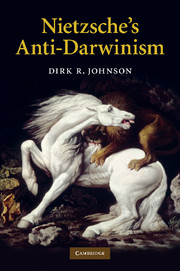Book contents
- Frontmatter
- Contents
- Acknowledgements
- Abbreviations
- Introduction
- Part I Early Darwinism to the “Anti-Darwin”
- Chapter 1 Towards the “Anti-Darwin”: Darwinian meditations in the middle period
- Chapter 2 Overcoming the “man” in man: Zarathustra's transvaluation of Darwinian categories
- Chapter 3 Nietzsche agonistes: a personal challenge to Darwin
- Part II Nietzsche's Genealogy of Morals
- Conclusion
- Bibliography
- Index
Chapter 1 - Towards the “Anti-Darwin”: Darwinian meditations in the middle period
Published online by Cambridge University Press: 17 November 2010
- Frontmatter
- Contents
- Acknowledgements
- Abbreviations
- Introduction
- Part I Early Darwinism to the “Anti-Darwin”
- Chapter 1 Towards the “Anti-Darwin”: Darwinian meditations in the middle period
- Chapter 2 Overcoming the “man” in man: Zarathustra's transvaluation of Darwinian categories
- Chapter 3 Nietzsche agonistes: a personal challenge to Darwin
- Part II Nietzsche's Genealogy of Morals
- Conclusion
- Bibliography
- Index
Summary
Nietzsche met George C. Robertson, editor of the quarterly Mind, at a resort in the Swiss Alps in the summer of 1877. Mind was the premier British journal open to new Darwinian perspectives in philosophy. In an enthusiastic letter to his friend Paul Rée, Nietzsche wrote: “Among the Englishmen staying here with me there is a very genial professor of philosophy at London University College, Robertson, editor of the best English journal for philosophy Mind, a quarterly review … All the great names of England – Darwin … Spencer, Tylor, etc. – contribute to it … During his discussions on Darwin, Bagehot, etc., it occurred to me again how much I would have liked you to have taken part in this company, the only true philosophical one currently available.” Nietzsche's unmitigated praise for “all the great names of England” would later turn into scornful derision – the “English psychologists” of GM. Within a span of ten years, Nietzsche gravitated from considering Darwin and his “school” “the only true philosophical company” to writing a scathing indictment of their positions. What had transpired in these ten years? How did Darwin go from being his great inspiration in the 1870s to becoming the target of his “Anti-Darwin” writings of 1888?
Many of the answers to these questions lie buried in the often-neglected middle period of his philosophizing. At that time, Nietzsche entered into a subtle, fascinating, and fruitful dialogue with Darwin-inspired genealogical perspectives.
- Type
- Chapter
- Information
- Nietzsche's Anti-Darwinism , pp. 17 - 46Publisher: Cambridge University PressPrint publication year: 2010



